2017年高考真题英语听力原文(北京卷)
2017年北京英语高考试题文档版含答案

绝密★启用前2017年普通高等学校全国招生统一考试(北京卷)英语本试卷共16页,共150分。
考试时长120分钟。
考生务必将答案答在答题卡上,在试卷上作答无效。
考试结束后,将本试卷和答题卡一并交回。
第一部分:听力理解(共三节,30分)第一节(共5小题;每小题1.5分,满分7.5分)听下面5段对话。
每段对话后有一道小题,从每题所给的A、B、C三个选项中选出最佳选项。
听完每段对话后,你都有10秒钟的时间来回答有关小题和阅读下一小题。
每段对话你将听一遍。
例:What is the man going to read?A.A newspaper. B.A magazine. C.A book. 答案是A。
1.When will the film start?A.At 5:00. B.At 6:00. C.At 7:00.2.Which club will the man join?A.The film club. B.The travel club. C.The sports club.3.What was the weather like in the mountains yesterday?A.Sunny. B.Windy. C.Snowy.4.What does the man want to cut out of paper?A.A fish. B.A bird. C.A monkey.5.Where does the conversation most probably take place?A.In a library. B.At a bookstore. C.In a museum.第二节(共10小题;每小题1.5分,15分)听下面4段对话或独白。
每段对话或独白后有几道小题,从每题所给的A、B、C三个选项中选出最佳选项。
听每段对话或独白前,你将有5秒钟的时间阅读每小题。
听完后,每小题将给出5秒钟的作答时间。
2017年全国统一高考英语试卷听力+原文+答案(新课标i)

2017年全国统一高考英语试卷(新课标I)听力试题第一部分听力(共两节,满分30分)做题时,先将答案标在试卷上。
录音内容结束后,你将有两分钟的时间将试卷上的答案转涂到答题卡上。
第一节(共5小题;每小题1.5分,满分7.5分)听下面5段对话。
每段对话后有一个小题,从题中所给的A、B、C三个选项中选出最佳选项。
听完每段对话后,你都有10秒钟的时间来回答有关小题和阅读下一小题。
每段对话仅读一遍。
例: How much is the shirt?A. £19.15.B. £9.18.C. £9.15.答案是C.1. What does the woman think of the movie?A. It’s amusing.B. It’s exciting.C. It’s disappointing.2. How will Susan spend most of her time in France?A. Traveling around.B. Studying at a school.C. Looking after her aunt.3. What are the speakers talking about?A. Going out.B. Ordering drinks.C. Preparing for a party.4. Where are the speakers?A. In a classroom.B. In a library.C. In a bookstore.5. What is the man going to do ?A. Go on the Internet.B. Make a phone call.C. Take a train trip.第二节(共15小题;每小题1.5分,满分22.5分)听下面5段对话或独白。
每段对话或独白后有几个小题,从题中所给的A、B、C三个选项中选出最佳选项。
(word完整版)2017年高考英语全国卷3听力试题与录音原文

2017年普通高等学校招生全国统一考试英语(考试时间:120 分钟试卷满分:150 分)注意事项:1.答卷前,考生务必将自己的姓名、准考证号填写在答题卡上。
3.回答选择题时,选出每小题答案后,用铅笔把答题卡上对应题目的答案标号涂黑。
如需改动,用橡皮擦干净后,再选涂其他答案标号。
回答非选择题时,将答案写在答题卡上,写在本试卷上无效。
3.考试结束后,将本试卷和答题卡一并交回。
第一部分听力(共两节,满分30分)做题时,先将答案标在试卷上,录音内容结束后,你将有两分钟的时间将试卷上的答案转涂到答题卡上。
第一节(共5小题,每小题 1.5分,满分7.5分)听下面 5 段对话,每段对话后有一个小题,从题中所给的A、B、C 三个选项中选出最佳选项。
听完每段对话后,你都有10 秒钟的时间来回答有关小题和阅读下一小题。
学/ 科网每段对话仅读一遍。
例:How much is the shirt?A. £19.15.B. £9.18.C. £9.15.答案是C。
1. What will the woman do this afternoon?A. Do some exercise.B. Go shopping.C. Wash her clothes.2. Why does the woman call the man?A. To cancel a flight.B. To make an apology.C. To put off a meeting.3. How much more does David need for the car?A. $ 5,000.B. $20,000.C. $25,000.4. What is Jane doing?A. Planning a tour.B. Calling her father.C. Asking for leave.5. How does the man feel?A. Tired.B. Dizzy.C. Thirsty.第二节(共15小题;每小题 1.5分,满分22.5分)听下面 5 段对话或独白。
(精校版)2017年北京英语高考试题文档版(含答案)

绝密★启用前2017年普通高等学校全国招生统一考试(北京卷)英语本试卷共16页,共150分。
考试时长120分钟。
考生务必将答案答在答题卡上,在试卷上作答无效。
考试结束后,将本试卷和答题卡一并交回。
第一部分:听力理解(共三节,30分)第一节(共5小题;每小题 1.5分,满分7.5分)听下面5段对话。
每段对话后有一道小题,从每题所给的A、B、C三个选项中选出最佳选项。
听完每段对话后,你都有10秒钟的时间来回答有关小题和阅读下一小题。
每段对话你将听一遍。
例:What is the man going to read?A.A newspaper. B.A magazine. C.A book.答案是A。
1.When will the film start?A.At 5:00. B.At 6:00. C.At 7:00.2.Which club will the man join?A.The film club. B.The travel club. C.The sports club.3.What was the weather like in the mountains yesterday?A.Sunny. B.Windy. C.Snowy.4.What does the man want to cut out of paper?A.A fish. B.A bird. C.A monkey.5.Where does the conversation most probably take place?A.In a library. B.At a bookstore. C.In a museum.第二节(共10小题;每小题 1.5分,15分)听下面4段对话或独白。
每段对话或独白后有几道小题,从每题所给的A、B、C三个选项中选出最佳选项。
听每段对话或独白前,你将有5秒钟的时间阅读每小题。
听完后,每小题将给出5秒钟的作答时间。
2017年高考真题英语(北京卷)详细解析

绝密★启用前2017年普通高等学校全国招生统一考试(北京卷)英语本试卷共16页,共150分。
考试时长120分钟。
考生务必将答案答在答题卡上,在试卷上作答无效。
考试结束后,将本试卷和答题卡一并交回。
第一部分:听力理解(共三节,30分)第一节(共5小题;每小题1.5分,满分7.5分)听下面5段对话。
每段对话后有一道小题,从每题所给的A、B、C三个选项中选出最佳选项。
听完每段对话后,你都有10秒钟的时间来回答有关小题和阅读下一小题。
每段对话你将听一遍。
例:What is the man going to read?A.A newspaper. B.A magazine. C.A book.答案是A。
1.When will the film start?A.At 5:00. B.At 6:00. C.At 7:00.2.Which club will the man join?A.The film club. B.The travel club. C.The sports club. 3.What was the weather like in the mountains yesterday?A.Sunny. B.Windy. C.Snowy.4.What does the man want to cut out of paper?A.A fish. B.A bird. C.A monkey.5.Where does the conversation most probably take place?A.In a library. B.At a bookstore. C.In a museum.第二节(共10小题;每小题1.5分,15分)听下面4段对话或独白。
每段对话或独白后有几道小题,从每题所给的A、B、C三个选项中选出最佳选项。
听每段对话或独白前,你将有5秒钟的时间阅读每小题。
听完后,每小题将给出5秒钟的作答时间。
07年高考真题——英语(北京卷)详细解析
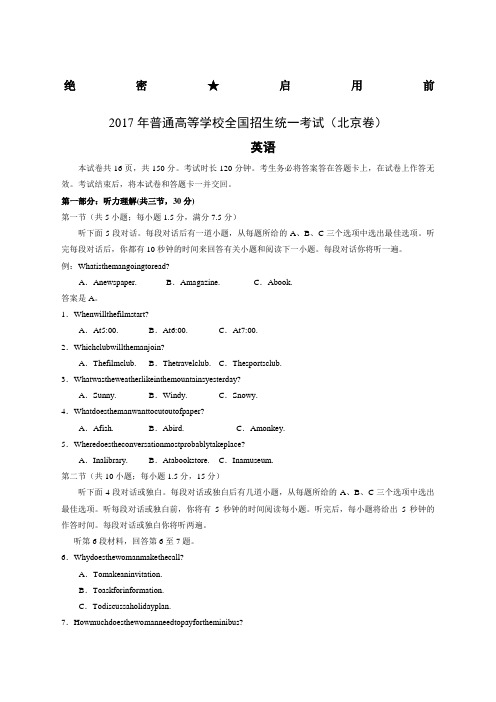
绝密★启用前2017年普通高等学校全国招生统一考试(北京卷)英语本试卷共16页,共150分。
考试时长120分钟。
考生务必将答案答在答题卡上,在试卷上作答无效。
考试结束后,将本试卷和答题卡一并交回。
第一部分:听力理解(共三节,30分)第一节(共5小题;每小题1.5分,满分7.5分)听下面5段对话。
每段对话后有一道小题,从每题所给的A、B、C三个选项中选出最佳选项。
听完每段对话后,你都有10秒钟的时间来回答有关小题和阅读下一小题。
每段对话你将听一遍。
例:Whatisthemangoingtoread?A.Anewspaper. B.Amagazine. C.Abook.答案是A。
1.Whenwillthefilmstart?A.At5:00. B.At6:00. C.At7:00.2.Whichclubwillthemanjoin?A.Thefilmclub. B.Thetravelclub. C.Thesportsclub. 3.Whatwastheweatherlikeinthemountainsyesterday?A.Sunny. B.Windy. C.Snowy. 4.Whatdoesthemanwanttocutoutofpaper?A.Afish. B.Abird. C.Amonkey. 5.Wheredoestheconversationmostprobablytakeplace?A.Inalibrary. B.Atabookstore. C.Inamuseum.第二节(共10小题;每小题1.5分,15分)听下面4段对话或独白。
每段对话或独白后有几道小题,从每题所给的A、B、C三个选项中选出最佳选项。
听每段对话或独白前,你将有5秒钟的时间阅读每小题。
听完后,每小题将给出5秒钟的作答时间。
每段对话或独白你将听两遍。
听第6段材料,回答第6至7题。
6.Whydoesthewomanmakethecall?A.Tomakeaninvitation.B.Toaskforinformation.C.Todiscussaholidayplan.7.Howmuchdoesthewomanneedtopayfortheminibus?A.$50. B.$150. C.$350.听第7段材料,回答第8至9题。
2017年全国高考英语试卷听力+原文+答案(新课标i)
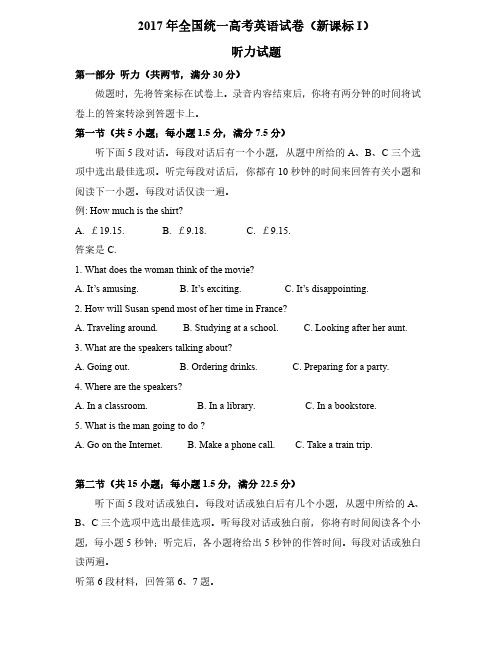
2017年全国统一高考英语试卷(新课标I)听力试题第一部分听力(共两节,满分30分)做题时,先将答案标在试卷上。
录音内容结束后,你将有两分钟的时间将试卷上的答案转涂到答题卡上。
第一节(共5小题;每小题1.5分,满分7.5分)听下面5段对话。
每段对话后有一个小题,从题中所给的A、B、C三个选项中选出最佳选项。
听完每段对话后,你都有10秒钟的时间来回答有关小题和阅读下一小题。
每段对话仅读一遍。
例:How much is the shirt?A.£19.15.B.£9.18.C.£9.15.答案是C.1.What does the woman think of the movie?A.It’s amusing.B.It’s exciting.C.It’s disappointing.2.How will Susan spend most of her time in France?A.Traveling around.B.Studying at a school.C.Looking after her aunt.3.What are the speakers talking about?A.Going out.B.Ordering drinks.C.Preparing for a party.4.Where are the speakers?A.In a classroom.B.In a library.C.In a bookstore.5.What is the man going to do?A.Go on the Internet.B.Make a phone call.C.Take a train trip.第二节(共15小题;每小题1.5分,满分22.5分)听下面5段对话或独白。
每段对话或独白后有几个小题,从题中所给的A、B、C三个选项中选出最佳选项。
听每段对话或独白前,你将有时间阅读各个小题,每小题5秒钟;听完后,各小题将给出5秒钟的作答时间。
2017年全国统一高考英语试卷听力+原文+答案(新课标Ⅱ、Ⅲ)
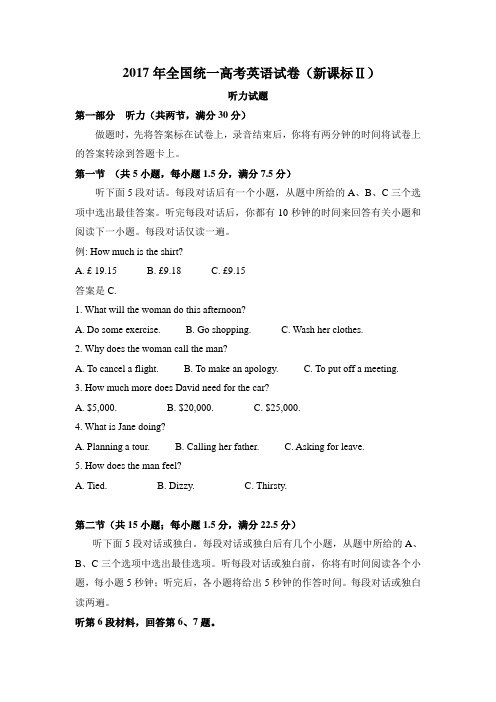
2017年全国统一高考英语试卷(新课标Ⅱ)听力试题第一部分听力(共两节,满分30分)做题时,先将答案标在试卷上,录音结束后,你将有两分钟的时间将试卷上的答案转涂到答题卡上。
第一节(共5小题,每小题1.5分,满分7.5分)听下面5段对话。
每段对话后有一个小题,从题中所给的A、B、C三个选项中选出最佳答案。
听完每段对话后,你都有10秒钟的时间来回答有关小题和阅读下一小题。
每段对话仅读一遍。
例: How much is the shirt?A. £ 19.15B. £9.18C. £9.15答案是C.1. What will the woman do this afternoon?A. Do some exercise.B. Go shopping.C. Wash her clothes.2. Why does the woman call the man?A. To cancel a flight.B. To make an apology.C. To put off a meeting.3. How much more does David need for the car?A. $5,000.B. $20,000.C. $25,000.4. What is Jane doing?A. Planning a tour.B. Calling her father.C. Asking for leave.5. How does the man feel?A. Tied.B. Dizzy.C. Thirsty.第二节(共15小题;每小题1.5分,满分22.5分)听下面5段对话或独白。
每段对话或独白后有几个小题,从题中所给的A、B、C三个选项中选出最佳选项。
听每段对话或独白前,你将有时间阅读各个小题,每小题5秒钟;听完后,各小题将给出5秒钟的作答时间。
每段对话或独白读两遍。
听第6段材料,回答第6、7题。
(完整版)2017年高考真题英语听力原文(北京卷)
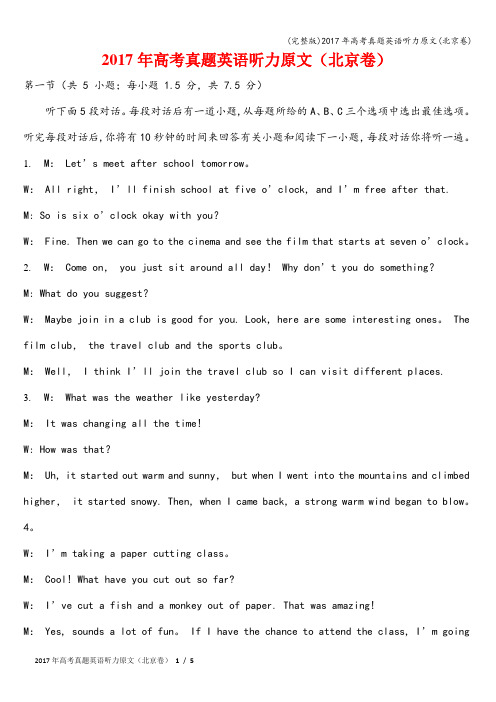
2017年高考真题英语听力原文(北京卷)第一节(共 5 小题;每小题 1.5 分,共 7.5 分)听下面5段对话。
每段对话后有一道小题,从每题所给的A、B、C三个选项中选出最佳选项。
听完每段对话后,你将有10秒钟的时间来回答有关小题和阅读下一小题,每段对话你将听一遍。
1. M:Let’s meet after school tomorrow。
W: All right,I’ll finish school at five o’clock, and I’m free after that.M: So is six o’clock okay with you?W:Fine. Then we can go to the cinema and see the film that starts at seven o’clock。
2. W: Come on, you just sit around all day!Why don’t you do something?M: What do you suggest?W: Maybe join in a club is good for you. Look, here are some interesting ones。
The film club, the travel club and the sports club。
M: Well,I think I’ll join the travel club so I can visit different places.3. W: What was the weather like yesterday?M: It was changing all the time!W: How was that?M: Uh, it started out warm and sunny, but when I went into the mountains and climbed higher, it started snowy. Then, when I came back, a strong warm wind began to blow。
2017年高考英语北京卷

2017年普通高等学校全国招生统一考试(北京卷)英语第一部分:听力理解(共三节,30分)第一节(共5小题;每小题1.5分,满分7.5分)听下面5段对话每段对话后有一道小题,从每题所给的A、B、C三个选项中选出最佳选项听完每段对话后,你都有10秒钟的时间来回答有关小题和阅读下一小题每段对话你将听一遍例:What is the man going to read?A. A newspaper.B. A magazine.C. A book.答案是A1. When will the film start?A. At 5:00.B. At 6:00.C. At 7:00.2. Which club will the man join?A. The film club.B. The travel club.C. The sports club.3. What was the weather like in the mountains yesterday?A. Sunny.B. Windy.C. Snowy.4. What does the man want to cut out of paper?A. A fish.B. A bird.C. A monkey.5. Where does the conversation most probably take place?A. In a library.B. At a bookstore.C. In a museum.第二节(共10小题;每小题1.5分,15分)听下面4段对话或独白每段对话或独白后有几道小题,从每题所给的A、B、C三个选项中选出最佳选项听每段对话或独白前,你将有5秒钟的时间阅读每小题听完后,每小题将给出5秒钟的作答时间每段对话或独白你将听两遍听第6段材料,回答第6至7题6. Why does the woman make the call?A. To make an invitation.B. To ask for information.C. To discuss a holiday plan .7. How much does the woman need to pay for the minibus?A. $50.B. $150.C. $350.听第7段材料,回答第8至9题8. What are the two speakers mainly talking about?A. Electronic waste.B. Soil pollution.C. Recycling benefits.9. What does the woman decide to do with her cell phone in the end?A. Throw it away.B. Keep it at home.C. Sell it to be recycled.听第8段材料,回答第10至12题10. What is the possible relationship between the two speakers?A. Friends.B. Wife and husband.C. Business partners.11. Where does the woman work now?A. In a school.B. In a restaurant.C. In a travel agency.12. What are the two speakers going to do?A. To take a trip.B. To have a coffee.C. To attend a meeting.听第9段材料,回答第13至15题13. What has been improved according to the speaker?A. The train station.B. The bus service.C. The parking lot.14. How does the speaker get to her office today?A. By bus and on foot.B. By train and by bus.C. By train and on foot.15. Who is the speaker?A. A reporter.B. A policeman.C. A photographer.第三节(共5小题;每小题1.5分,共7.5分)听下面一段对话,完成第16至20五道小题,每小题仅填写一个词听对话前,你将有20秒钟的时间阅读试题,听完后你将有60秒钟的作答时间这段对话你将听两遍Pick-up Appointment FormItem(物品) A 16 and some magazinesDestination Overseas to 17Delivery ☑Air □RegularTime to pick up 5:00 18 afternoonPacking A medium boxCustomer's information Mr. Hudson 1989 Street, Chicago, 20Tel:4159786第二部分:知识运用(共两节,45 分)第一节单项填空(共15 小题;每小题1 分,共15 分)从每题所给的A、B、C、D 四个选项中,选出可以填入空白处的最佳选项,并在答题卡上将该项涂黑例:It’s so nice to hear from her again, ________, we last met more than thirty years ago.A. What’s moreB. That’s to sayC. In other wordsD. Believe it or not答案是D21. Samuel, the tallest boy in our class, ______ easily reach the books on the top shelf.A. mustB. shouldC. canD. need22. —Peter, please send us postcards ______ we’ll know where you have visited.—No problem.A. butB. orC. forD. so23. Every year, ______ makes the most beautiful kite will win a prize in the Kite Festival.A. whateverB. whoeverC. whomeverD. whichever24. —______ that company to see how they think of our product yesterday?—Yes. They are happy with it.A. Did you callB. Have you calledC. Will you callD. Were you calling25. ______ birds use their feathers for flight, some of their feathers are for other purposes.A. OnceB. IfC. AlthoughD. Because26. Jane moved aimlessly down the tree-lined street, not knowing ______she was heading.A. whyB. whereC. howD. when27. Many airlines now allow passengers to print their boarding passes online ______ their valuable time.A. saveB. savingC. to saveD. saved28. If you don’t understand something, you may research, study, and talk to other people _______ you figure it out.A. becauseB. thoughC. untilD. since29. In the 1950s in the USA, most families had just one phone at home, and wireless phones _______ yet.A. haven’t inventedB. haven’t been inventedC. hadn’t inventedD. hadn’t been invented30. The national park has a large collection of wildlife, _________ from butterflies to elephants.A. rangingB. rangeC. to rangeD. ranged31. The little problems ______ we meet in our daily lives may be inspirations for great inventions.A. thatB. asC. whereD. when32. Jim has retired, but he still remembers the happy time _______ with his students.A. to spendB. spendC. spendingD. spent33. People ______ better access to health care than they used to, and they’re living longer as a result.A. will haveB. haveC. hadD. had had34. If the new safety system _______ to use, the accident would never have happened.A. had been putB. were putC. should be putD. would be put35. Many people who live along the coast make a living _______ fishing industry.A. atB. inC. onD. by第二节完形填空(共20 小题;每小题1.5 分,共30 分)阅读下面短文,掌握其大意,从每题所给的A、B、C、D 四个选项中,选出最佳选项,并在答题卡上将该项涂黑Hannah Taylor is a schoolgirl from Manitoba, Canada. One day, when she was five years old, she was walking with her mother in downtown Winnipeg. They saw a man 36 out of a garbage can. She asked her mother why he did that and her mother said that the man was homeless and hungry. Hannah was very 37 . She couldn't understand why some people had to live their lives without shelter or enough food. Hannah started to think about how she could 38 ,but, of course, there is not a lot one five-year-old can do to solve(解决)the problem of homelessness.Later, when Hannah attended school, she saw another homeless person. It was a woman, 39 an old shopping trolley(购物车)which was piled with 40 . It seemed that everything the woman owned was in them. This made Hannah very sad, and even more 41 to do something. She had been talking to her mother about the lives of homeless people 42 they first saw the homeless man. Her mother told her that if she did something to change the problem that made her sad, she wouldn’t43 as bad.Hannah began to speak out about the homelessness in Manitoba and then in other provinces. She hoped to 44 her message of hope and awareness. She started the Ladybug Foundation, an organization aiming at getting rid of homelessness. She began to 45 “Big Bosses” lunches, where she would try to persuade local business leaders to 46 to the cause. She also organized a fundraising(募捐)drive in “Ladybug Jars” to collect everyone`s spare change during “Make Change” month. More recently, the foundation began another 47 called National Red Scarf Day—a day when people donate $20 and wear red scarves in support of Canada`s 48 and homeless.There is an emergency shelter in Winnipeg called “Hannah`s Place”, something that Hannah is very 49 of. Hannah`s Place is divided into several areas, providing shelter for people when it isso cold that 50 outdoors can mean death. In the more than five years since Hannah began her activities, she has received a lot of 51 .For example, she received the 2007 BRICK Award recognizing the 52 of young people to change the world. But 53 all this, Hannah still has the 54 life of a Winnipeg schoolgirl, except that she pays regular visits to homeless people. Hannah is one of many examples of young people who are making a 55 in the world. You can, too!36. A. jumping B. eating C. crying D. waving37. A. annoyed B. nervous C. ashamed D. upset38. A. behave B. manage C. help D. work39. A. pushing B. carrying C. buying D. holding40. A. goods B. bottles C. foods D. bags41. A. excited B. determined C. energetic D. grateful42. A. since B. unless C. although D. as43. A. sound B. get C. feel D. look44. A. exchange B. leave C. keep D. spread45. A. sell B. deliver C. host D. pack46. A. contribute B. lead C. apply D. agree47. A. campaign B. trip C. procedure D. trial48. A. elderly B. hungry C. lonely D. sick49. A. aware B. afraid C. proud D. sure50 A. going B. sleeping C. traveling D. playing51. A. praises B. invitations C. replies D. appointments52. A. needs B. interests C. dreams D. efforts53. A. for B. through C. besides D. along54. A. healthy B. public C. normal D. tough55. A. choice B. profit C. judgement D. difference第三部分:阅读理解(共两节,40 分)第一节(共15 小题;每小题 2 分,共30 分)阅读下列短文,从每题所给的A、B、C、D 四个选项中,选出最佳选项,并在答题卡上将该项涂黑AIt was a cold March day in High Point, North Carolina. The girls on the Wesleyan Academy softball were waiting for their next turns at bat during practice, stamping their feet to stay warm, Eighth-grader Taylor Bisbee shivered(发抖) a little as she watched her teammate Paris White play. The two didn’t know each other well — Taylor had just moved to town a month or so before.Suddenly, Paris fell to the ground,“Paris’s eye rolled back,” Taylor says. “She started shaking.I knew it was an emergency.”It certainly was, Paris had suffered a sudden heart failure. Without immediate medical care, Paris would die. At first no one moved. The girls were in shock. Then the softball coach shouted out, “Does anyone know CPR?”CPR is a life-saving technique. To do CPR, you press on the sick person’s chest so that blood moves through the body and takes oxygen to organs. Without oxygen the brain is damaging quickly.Amazingly, Taylor had just taken a CPR course the day before. Still, she hesitated. She didn’t think she knew it well enough. But when no one else came forward, Taylor ran to Paris and began doing CPR, “It was scary. I knew it was the difference between life and death,” says Taylor.Taylor’s swift action helped her te ammates calm down. One girl called 911. Two more ran to get the school nurse, who brought a defibrillator, an electronic devices(器械) that can shock the heart back into work. Luck stayed with them: Paris’ heartbeat returned.“I know I was really lucky,” Paris says now. “Most people don’t survive this. My team saved my life.”Experts say Paris is right: For a sudden heart failure, the single best chance for survival is having someone nearby step in and do CPR quickly.Today, Paris is back on the softball team. Taylor will apply to college soon. She wants to be a nurse. “I feel more confident in my actions now,” Taylor says. “I know I can act under pressure in a scary situation.”56. What happened to Paris on a March day?A. She caught a bad cold.B. She had a sudden heart problem.C. She was knocked down by a ball.D. She shivered terribly during practice57. Why does Paris say she was lucky?A. She made a worthy friend.B. She recovered from shock.C. She received immediate CPR.D. She came back on the softball team.58. Which of the following words can best describe Taylor?A. Enthusiastic and kind.B. Courageous and calm.C. Cooperative and generous.D. Ambitious and professional.BInspiring young minds!TOKNOW Magazine is a big hit in th e world of children’s publishing, bringing a unique combination of challenging ideas and good fun to young fans every month.Sounds too good to be true?Take a look online—evidence shows that thousands of teachers and parents know a good thing when they see it and recommend TOKNOW to their friends.Happy Birthday All Year!What could be more fun than a gift that keeps coming through the letterbox every month? The first magazine with your gift message will arrive in time for the special day.SUBSCRIBE NOW□Annual SubscriptionEurope £55 Rest of World £65□Annual Subscription with Gift PackIncludes a Mammoth Map, a passport Puzzle Booklet, and SubscriptionEurope £60 Rest of World £70Refund Policy—the subscription can be canceled within 28 days and you can get your money back.59. Why is TOKNOW a special magazine?A. It entertains young parents.B. It provides serious advertisements.C. It publishes popular science fictions.D. It combines fun with complex concepts.60. What does TOKNOW offer its readers?A. Online courses.B. Articles on new topics.C. Lectures on a balanced life.D. Reports on scientific discoveries.61. How much should you pay if you make a 12-mouth subscription to TOKNOW with gift pack from China?A. £55.B. £60.C. £65.D. £70.62. Subscribers of TOKNOW would get .A. free birthday presentsB. full refund within 28 daysC. membership of the TOKNOW clubD. chances to meet the experts in personCMeasles(麻疹), which once killed 450 children each year and disabled even more, was nearly wiped out in the United States 14 years ago by the universal use of the MMR vaccine(疫苗). But the disease is making a comeback, caused by a growing anti-vaccine movement and misinformation that is spreading quickly. Already this year, 115 measles cases have been reported in the USA, compared with 189 for all of last year.The numbers might sound small, but they are the leading edge of a dangerous trend. When vaccination rates are very high, as they still are in the nation as a whole, everyone is protected. This is called “herd immunity”, which protects the people who get hurt easily, including those who can’t be vaccinated for medical reasons, babies too young to get vaccinated and people on whom the vaccine doesn’t work.But herd immunity works only when nearly the whole herd joins in. When some refuse vaccination and seek a free ride, immunity breaks down and everyone is in even bigger danger. That’s exactly what is happening in small neighborhoods around the country from Orange County, California, where 22 measles cases were reported this month, to Brooklyn, N.Y., where a 17-year-old caused an outbreak last year.The resistance to vaccine has continued for decades, and it is driven by a real but very small risk. Those who refuse to take that risk selfishly make others suffer.Making things worse are state laws that make it too easy to opt out(决定不参加) of what are supposed to be required vaccines for all children entering kindergarten. Seventeen states allow parents to get an exemption(豁免), sometimes just by signing a paper saying they personally object to a vaccine.Now, several states are moving to tighten laws by adding new regulations for opting out. But no one does enough to limit exemptions.Parents ought to be able to opt out only for limited medical or religious reasons. But personal opinions? Not good enough. Everyone enjoys the life-saving benefits vaccines provide, but they’ll exist only as long as everyone shares in the risks.63.The first two paragraphs suggest that ____________.A.a small number of measles cases can start a dangerous trendB.the outbreak of measles attracts the public attentionC.anti-vaccine movement has its medical reasonsD.information about measles spreads quickly64.Herd immunity works well when ____________.A.exemptions are allowedB.several vaccines are used togetherC.the whole neighborhood is involved inD.new regulations are added to the state laws65.What is the main reason for the comeback of measles?A.The overuse of vaccine.B.The lack of medical care.C.The features of measles itself.D.The vaccine opt-outs of some people.66.What is the purpose of the passage?A.To introduce the idea of exemption.B.To discuss methods to cure measles.C.To stress the importance of vaccination.D.To appeal for equal rights in medical treatment.DHollywood’s theory that machines with evil(邪恶) minds will drive armies of killer robots is just silly. The real problem relates to the possibility that artificial intelligence(AI) may become extremely good at achieving something other than what we really want. In 1960 a well-known mathematician Norbert Wiener, who founded the field of cybernetics(控制论), put it this way: “If we use, to achieve our purposes, a mechanical agency with whose operation we cannot effectively interfere(干预), we had better be quite sure that the purpose put into the machine is the purpose which we really desire.”A machine with a specific purpose has another quality, one that we usually associate with living things: a wish to preserve its own existence. For the machine, this quality is not in-born, nor is it something introduced by humans; it is a logical consequence of the simple fact that the machine cannot achieve its original purpose if it is dead. So if we send out a robot with the single instruction of fetching coffee, it will have a strong desire to secure success by disabling its own off switch or even killing anyone who might interfere with its task. If we are not careful, then, we could face a kind of global chess match against very determined, super intelligent machines whose objectives conflict with our own, with the real world as the chessboard.The possibility of entering into and losing such a match should concentrate the minds of computer scientists. Some researchers argue that we can seal the machines inside a kind of firewall,using them to answer difficult questions but never allowing them to affect the real world. Unfortunately, that plan seems unlikely to work: we have yet to invent a firewall that is secure against ordinary humans, let alone super intelligent machines.Solving the safety problem well enough to move forward in AI seems to be possible but not easy. There are probably decades in which to plan for the arrival of super intelligent machines. But the problem should not be dismissed out of hand, as it has been by some AI researchers. Some argue that humans and machines can coexist as long as they work in teams—yet that is not possible unless machines share the goals of humans. Others say we can just “switch them off” as if super intelligent machines are too stupid to think of that possibility. Still others think that super intelligent AI will never happen. On September 11, 1933, famous physicist Ernest Rutherford stated, with confidence, “Anyone who expects a source of power in the transformation of these atoms is talking moonshine.” However, on September 12, 1933, physicist Leo Szilard invented the neutron-induced(中子诱导) nuclear chain reaction.67. Paragraph 1 mainly tells us that artificial intelligence may .A. run out of human controlB. satisfy human’s real desiresC. command armies of killer robotsD. work faster than a mathematician68. Machines with specific purposes are associated with living things partly because they might be able to .A. prevent themselves from being destroyedB achieve their original goals independentlyC. do anything successfully with given ordersD. beat humans in international chess matches69. According to some researchers, we can use firewalls to .A. help super intelligent machines work betterB. be secure against evil human beingsC. keep machines from being harmedD. avoid robots’ affecting the world70. What does the author think of the safety problem of super intelligent machines?A. It will disappear with the development of AI.B. It will get worse with human interference.C. It will be solved but with difficulty.D. It will stay for a decade.第二节(共5 小题;每小题2 分,共10 分)根据短文内容,从短文后的七个选项中选出能填入空白处的最佳选项选项中有两项为多余选项Every animal sleeps, but the reason for this has remained foggy. When lab rats are not allowed to sleep, they die within a month. 71One idea is that sleep helps us strengthen new memories. 72 We know that, while awake, fresh memories are recorded by reinforcing (加强) connections between brain cells, but the memory processes that take place while we sleep have been unclear.Support is growing for a theory that sleep evolved so that connections between neurons(神经元) in the brain can be weakened overnight, making room for fresh memories to form the nextday. 73Now we have the most direct evidence yet that he is right. 74 The synapses in the mice taken at the end of a period of sleep were 18 per cent smaller than those taken before sleep, showing that the connections between neurons weaken while sleeping.If Tononi’s theory is right, it would explain why, w hen we miss a night`s, we find it harder the next day to concentrate and learn new information — our brains may have smaller room for new experiences.Their research also suggests how we may build lasting memories over time even though the synapses become thinner. The team discovered that some synapses seem to be protected and stayed the same size. 75 “You keep what matters,” Tononi says.A. We should also try to sleep well the night before.B. It’s as if the brain is preserving its most important m emories.C. Similarly, when people go for a few days without sleeping, they get sick.D. The processes take place to stop our brains becoming loaded with memories.E. That’s why students do better in tests if they get a chance to sleep after learning.F. “Sleep is the price we pay for learning,” says Giulio Tononi, who developed the idea.G. Tononi’s team measured the size of these connections, or synapses, in the brains of 12 mice.第四部分:书面表达(共两节,35 分)第一节(15分)你的英国朋友Jim所在的学校要组织学生来中国旅行,有两条线路可以选择:“长江之行”或者“泰山之旅”Jim来信希望你能给些建议请你给他回信,内容包括:1.你建议的线路;2.你的理由;3.你的祝愿注意:1.词数不少于50;2.开头和结尾已给出,不计入总词数Dear Jim,Yours,Li Hua第二节(20 分)假设你是红星中学高三学生李华,请根据以下四幅图的先后顺序,写一篇英文周记,记录毕业前夕你们制作以“感恩母校”为主题的毕业纪念视频的全过程注意:词数不少于60提示词:视频video2017年普通高等学校招生全国统一考试英语(北京卷)参考答案第一部分:听力理解(共三节,30分)第一节(共5小题;每小题1.5分,共7.5分)1.C2. B3. C4. B5.A第二节(共10小题;每小题1.5分,共15分)6. B7.B8.A9.C 10.A11. C 12. B 13. A 14. C 15. A第三节(共5小题;每小题1.5分,共7.5分)每小题1.5分如出现拼写错误不计分;出现大小写、单复数错误扣0.5分;如每小题超过一个词不计分16. dictionary 17.Italy 18. Monday/Mon. 19. Acket/ACKET 20.15374第二部分:知识运用(共两节,45分)第一节单项填空(共15小题;每小题1分,共15分)21.C 22. D 23. B 24.A 25. C26.B 27.C 28.C 29.D 30.A31.A 32.D 33.B 34.A 35.B第二节完形填空(共20小题;每小题1.5分,共30分)36. B 37. D 38. C 39. A 40. D41. B 42. A 43. C 44. D 45. C46. A 47. A 48. B 49. C 50. B51. A 52. D 53. B 54. C 55. D第三部分:阅读理解(共两节,40分)第一节(共15小题;每小题2分,共30分)56. B 57. C 58. B 59. D 60. B61. D 62. B 63. A 64. C 65. D66. C 67. A 68. A 69. D 70. C第二节(共5小题;每小题2分,共10分)71. C 72. E 73. F 74. G 75. B第四部分第一节Dear Jim,I’m happy receive your letter and know you’re coming to China.Of the two trips to the Yangtze River and Mount Tai, both are highly recommended. Personally, I prefer the your along the Yangtze, the longest river and one of the mother rivers of Chinese civilization. You can learn a lot about the history of China and Chinese people. Moreover, the scenery along the river is amazing, with many well-known sightseeing spots. That’s why I think the trip along the Yangtze will be a better choice.Hope you’ll have a good time in China.YoursLi Hua第二节(20分)一、内容要点:1. 讨论分工2. 收集素材3. 编辑制作4. 放映视频精品文档二、One possible version:Graduation finally came. My classmates and I decided to do something. After a heated discussion, we agreed on making a video to record our experiences at school.Material collecting took us a whole week, during which we interviewed our teachers and took pictures of every aspect of school life. The editing part after that was tough. We debated over what to put into the video. Some compromises were unavoidable, but the video turned out perfect. Several days later, when the video was played on the graduation ceremony, it was well received. The students and teachers shared a great time. That surely gave us a great sense of achievement.。
2017年高考英语北京卷含答案解析
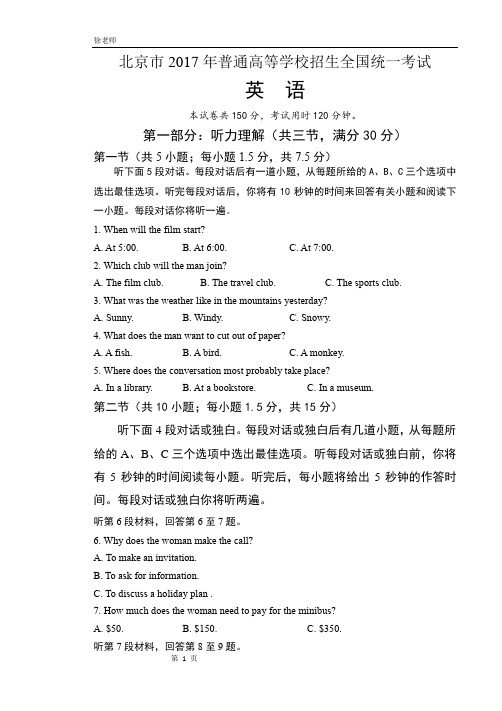
徐老师北京市2017年普通高等学校招生全国统一考试英语本试卷共150分,考试用时120分钟。
第一部分:听力理解(共三节,满分30分)第一节(共5小题;每小题1.5分,共7.5分)听下面5段对话。
每段对话后有一道小题,从每题所给的A、B、C三个选项中选出最佳选项。
听完每段对话后,你将有10秒钟的时间来回答有关小题和阅读下一小题。
每段对话你将听一遍。
1. When will the film start?A. At 5:00.B. At 6:00.C. At 7:00.2. Which club will the man join?A. The film club.B. The travel club.C. The sports club.3. What was the weather like in the mountains yesterday?A. Sunny.B. Windy.C. Snowy.4. What does the man want to cut out of paper?A. A fish.B. A bird.C. A monkey.5. Where does the conversation most probably take place?A. In a library.B. At a bookstore.C. In a museum.第二节(共10小题;每小题1.5分,共15分)听下面4段对话或独白。
每段对话或独白后有几道小题,从每题所给的A、B、C三个选项中选出最佳选项。
听每段对话或独白前,你将有5秒钟的时间阅读每小题。
听完后,每小题将给出5秒钟的作答时间。
每段对话或独白你将听两遍。
听第6段材料,回答第6至7题。
6. Why does the woman make the call?A. To make an invitation.B. To ask for information.C. To discuss a holiday plan .7. How much does the woman need to pay for the minibus?A. $50.B. $150.C. $350.听第7段材料,回答第8至9题。
2017年北京英语高考真题(含答案)

绝密★启用前2017年普通高等学校全国招生统一考试(北京卷)英语本试卷共16页,共150分。
考试时长120分钟。
考生务必将答案答在答题卡上,在试卷上作答无效。
考试结束后,将本试卷和答题卡一并交回。
第一部分:听力理解(共三节,30分)第一节(共5小题;每小题1.5分,满分7.5分)听下面5段对话。
每段对话后有一道小题,从每题所给的A、B、C三个选项中选出最佳选项。
听完每段对话后,你都有10秒钟的时间来回答有关小题和阅读下一小题。
每段对话你将听一遍。
例:What is the man going to read?A.A newspaper. B.A magazine. C.A book.答案是A。
1.When will the film start?A.At 5:00. B.At 6:00. C.At 7:00.2.Which club will the man join?A.The film club. B.The travel club. C.The sports club.3.What was the weather like in the mountains yesterday?A.Sunny. B.Windy. C.Snowy.4.What does the man want to cut out of paper?A.A fish. B.A bird. C.A monkey.5.Where does the conversation most probably take place?A.In a library. B.At a bookstore. C.In a museum.第二节(共10小题;每小题1.5分,15分)听下面4段对话或独白。
每段对话或独白后有几道小题,从每题所给的A、B、C三个选项中选出最佳选项。
听每段对话或独白前,你将有5秒钟的时间阅读每小题。
听完后,每小题将给出5秒钟的作答时间。
2017年北京市高考英语试卷(原卷版)

2017年北京市高考英语试卷本试卷共16页,共150分。
考试时长120分钟。
第一部分:听力理解(共三节,30分)第一节(共5小题;每小题1.5分,满分7.5分)听下面5段对话。
每段对话后有一道小题,从每题所给的A、B、C三个选项中选出最佳选项。
听完每段对话后,你都有10秒钟的时间来回答有关小题和阅读下一小题。
每段对话你将听一遍。
1. When will the film start?A. At 5:00.B. At 6:00.C. At 7:00.2. Which club will the man join?A. The film club.B. The travel club.C. The sports club.3. What was the weather like in the mountains yesterday?A. Sunny.B. Windy.C. Snowy.4. What does the man want to cut out of paper?A. A fish.B. A bird.C. A monkey.5. Where does the conversation most probably take place?A. In a library.B. At a bookstore.C. In a museum.第二节(共10小题;每小题1.5分,15分)听下面4段对话或独白。
每段对话或独白后有几道小题,从每题所给的A、B、C三个选项中选出最佳选项。
听每段对话或独白前,你将有5秒钟的时间阅读每小题。
听完后,每小题将给出5秒钟的作答时间。
每段对话或独白你将听两遍。
听第6段材料,回答第6至7题。
6. Why does the woman make the call?A. To make an invitation.B. To ask for information.C. To discuss a holiday plan .7. How much does the woman need to pay for the minibus?A. $50.B. $150.C. $350.听第7段材料,回答第8至9题。
2017年北京英语高考真题含答案

绝密★启用前2017年普通高等学校全国招生统一考试(北京卷)英语本试卷共16页,共150分。
考试时长120分钟。
考生务必将答案答在答题卡上,在试卷上作答无效。
考试结束后,将本试卷和答题卡一并交回。
第一部分:听力理解(共三节,30分)第一节(共5小题;每小题1.5分,满分7.5分)听下面5段对话。
每段对话后有一道小题,从每题所给的A、B、C三个选项中选出最佳选项。
听完每段对话后,你都有10秒钟的时间来回答有关小题和阅读下一小题。
每段对话你将听一遍。
例:What is the man going to read?A.A newspaper. B.A magazine. C.A book.答案是A。
1.When will the film start?A.At 5:00. B.At 6:00. C.At 7:00.2.Which club will the man join?A.The film club. B.The travel club. C.The sports club.3.What was the weather like in the mountains yesterday?A.Sunny. B.Windy. C.Snowy.4.What does the man want to cut out of paper?A.A fish. B.A bird. C.A monkey.5.Where does the conversation most probably take place?A.In a library. B.At a bookstore. C.In a museum.第二节(共10小题;每小题1.5分,15分)听下面4段对话或独白。
每段对话或独白后有几道小题,从每题所给的A、B、C三个选项中选出最佳选项。
听每段对话或独白前,你将有5秒钟的时间阅读每小题。
听完后,每小题将给出5秒钟的作答时间。
2017年高考_英语(北京卷)
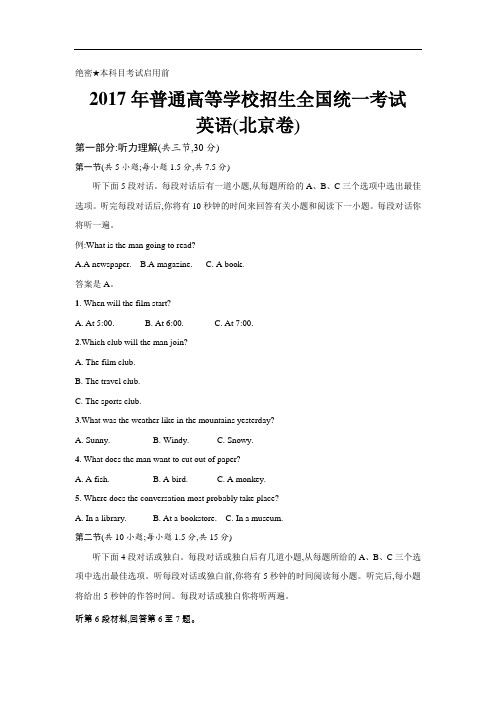
绝密★本科目考试启用前2017年普通高等学校招生全国统一考试英语(北京卷)第一部分:听力理解(共三节,30分)第一节(共5小题;每小题1.5分,共7.5分)听下面5段对话。
每段对话后有一道小题,从每题所给的A、B、C三个选项中选出最佳选项。
听完每段对话后,你将有10秒钟的时间来回答有关小题和阅读下一小题。
每段对话你将听一遍。
例:What is the man going to read?A.A newspaper.B.A magazine.C. A book.答案是A。
1. When will the film start?A. At 5:00.B. At 6:00.C. At 7:00.2.Which club will the man join?A. The film club.B. The travel club.C. The sports club.3.What was the weather like in the mountains yesterday?A. Sunny.B. Windy.C. Snowy.4. What does the man want to cut out of paper?A. A fish.B. A bird.C. A monkey.5. Where does the conversation most probably take place?A. In a library.B. At a bookstore.C. In a museum.第二节(共10小题;每小题1.5分,共15分)听下面4段对话或独白。
每段对话或独白后有几道小题,从每题所给的A、B、C三个选项中选出最佳选项。
听每段对话或独白前,你将有5秒钟的时间阅读每小题。
听完后,每小题将给出5秒钟的作答时间。
每段对话或独白你将听两遍。
听第6段材料,回答第6至7题。
6. Why does the woman make the call?A. To make an invitation.B. To ask for information.C. To discuss a holiday plan.7. How much does the woman need to pay for the minibus?A. $50.B. $150.C. $350.听第7段材料,回答第8至9题。
2017年高考英语试题北京卷

2017年普通高等学校全国招生统一考试(北京卷)英语本试卷共150分。
考试时长120分钟。
第一部分:听力理解(共三节,30分)第一节(共5小题;每小题1.5分,满分7.5分)听下面5段对话。
每段对话后有一道小题,从每题所给的A、B、C三个选项中选出最佳选项。
听完每段对话后,你都有10秒钟的时间来回答有关小题和阅读下一小题。
每段对话你将听一遍。
1.When will the film start?A.At 5:00.B.At 6:00.C.At 7:00.2.Which club will the man join?A.The film club.B.The travel club.C.The sports club.3.What was the weather like in the mountains yesterday?A.Sunny.B.Windy.C.Snowy.4.What does the man want to cut out of paper?A.A fish.B.A bird.C.A monkey.5.Where does the conversation most probably take place?A.In a library.B.At a bookstore.C.In a museum.第二节(共10小题;每小题1.5分,15分)听下面4段对话或独白。
每段对话或独白后有几道小题,从每题所给的A、B、C三个选项中选出最佳选项。
听每段对话或独白前,你将有5秒钟的时间阅读每小题。
听完后,每小题将给出5秒钟的作答时间。
每段对话或独白你将听两遍。
听第6段材料,回答第6至7题。
6.Why does the woman make the call?A.To make an invitation.B.To ask for information.C.To discuss a holiday plan .7.How much does the woman need to pay for the minibus?A.$50.B.$150.C.$350.听第7段材料,回答第8至9题。
- 1、下载文档前请自行甄别文档内容的完整性,平台不提供额外的编辑、内容补充、找答案等附加服务。
- 2、"仅部分预览"的文档,不可在线预览部分如存在完整性等问题,可反馈申请退款(可完整预览的文档不适用该条件!)。
- 3、如文档侵犯您的权益,请联系客服反馈,我们会尽快为您处理(人工客服工作时间:9:00-18:30)。
2017年高考真題英語聽力原文(北京卷)1.M: Let’s meet after school tomorrow.W: All right, I’ll finish school at five o’clock, and I’m free after that.M: So is six o’clock okay with you?W: Fine. Then we can go to the cinema and see the film that starts at seven o’clock.2.W: Come on, you just sit around all day! Why don’t you do something?M: What do you suggest?W: Maybe join in a club is good for you. Look, here are some interesting ones. The film club, the travel club and the sports club.M: Well, I think I’ll join the t ravel club so I can visit different places.3.W: What was the weather like yesterday?M: It was changing all the time!W: How was that?M: Uh, it started out warm and sunny, but when I went into the mountains and climbed higher, it started snowy. Then, when I came back, a strong warm wind began to blow.4.W: I’m taking a paper cutting class.M: Cool! What have you cut out so far?W: I’ve cut a fish and a monkey out of paper. That was amazing!M: Yes, sounds a lot of fun. If I have the chance to attend the c lass, I’m going to cut out a bird.5.W: What can I do for you?M: I want to check out these books.W: Your library card, please. Oh, you have lead fees. It comes to 4 dollars. You have to pay it off before you check out all books.M: Ok, no problem.6~7M: Ground transportation services. How can I help you?W: I have several guests coming to visit for the holidays, and I want to know how I can get them from the airport to my house.M: Okay, are you familiar with our door-to-door shuttle service?W: Yes, I can use it myself. The thing is, I have 50 dollars a person. That means 350 dollars for seven people. It’s a little expensive.M: How about hiring our mini bus?W: How much is it?M: It costs 150 dollars, and you can drive straight from the airport to your house.W: Oh, that sounds great. Can I make a reservation now?M: Sure, but I’ll need the flight information for your guests.W: Sorry, I don’t have the information now, I’ll call you back.M: Okay. Goodbye.8~9M: Hi, what will you do with your broken cellphone?W: I’ll throw it away. I don’t need it any more.M: Don’t throw away electronic waste carelessly! It’s dangerous to the environment!W: You mean I should keep these useless things at home?M: I’m not saying that. But do you know that every year a lot of useless computers and cellphones will ruin the soil?W: Oh, I see. So what do you think I should do then?M: You can sell the phone, and it can be recycled.W: All right. I think you are right. I’ll do that.M: Great.10~12.W: Peter? Hi, how are y ou? I haven’t seen you for ages!M: Hello, Mary. Well, it must be at least five years. What are you doing here?W: I came for a meeting. Business trip, you know. Anyway, how are you?M: I’m good, thanks. I still work in a school. What about you?W: I have a new job now, so I have to travel a lot.M: What do you do?W: I work for a travel agency. Working in a restaurant was just too boring.M: Your new job sounds interesting! Have you got time for a coffee? So we can catch up?W: Sure, why not?M: Oh, there’s a nice café about two minutes from here.W: Let’s go then.13~15W: It’s 8:00 am, and I’m on the platform at Sullivan Station. I’m waiting for the train to central station. I’m noticing that they’ve made improvements to this station. It’s cleaner, there are benches to sit on, and there are the arts on the walls. Because of that, this part of my trip has become more pleasant. Now it’s 8:30. I’ve arrived at the central station. The No.3 bus is in the weary side, and the bus is often very crowded at this time, so I choose to walk to my office. Still I have to say that trains and buses and walking are all better than driving. Traffic is getting worse every day and parking is more expensive. I guess it’s worth leaving my car at home. This is Jenny Waxlo reporting.16~20W: Hello, Park at delivery services. Can I help you?M: Yes. I need to send one package.W: What’s in the package?M: Uh, a dictionary and some magazines.W: Where are you sending your package?M: Overseas. To Italy.W: I see. And how will you send it? By air or regular mail?M: By air, please.W: All right. When is it convenient for the mailman to fetch the package?M: At 5 o’clock, Monday afternoon.W: Ok. By the way, does your package need packing?M: Yes. A medium box will do.W: Your name and address, please?M: Hudson Acket. 89 Street, Chicago, 15374.W: Could you spell your last name, please?M: It’s A-C-K-E-T.W: And your telephone number, please?M: It’s 4159786.W: How would you like to pay?M: With my credit card.W: Okay. Our mailma n will arrive at 89 Street, Chicago, 15374 at 5 o’clock, Monday afternoon. The package will be packed with a medium box, am I right?M: Yes. That’s it. Thank you. Have a nice day! W: You too.。
